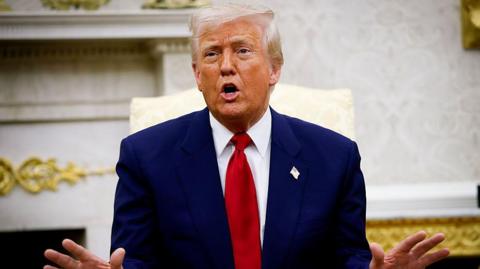This is all moving rather quickly now. Weekend reports in the US press claim White House trade hawk Pete Navarro is being sidelined too, in favour of US Treasury Secretary Scott Bessent.
Navarro was the author of the infamous equation that set so-called reciprocal tariff rates in proportion to the size of a country's trade surplus with the US, calling it "the sum of all cheating".
Bessent is now leading negotiations with trade partners seeking to avoid the reapplication of those rates after the 90-day pause.
There is a big question after 10 days of chaos. What is the incentive for other nations to offer much here? The Trump administration is clearly spooked by the bond market reaction to the president's trade plans, and questions surrounding the safe haven status of US debt for investors.
In trying to stave off effective interest rates on bonds rising to 5%, the US needs deals more than just those in surplus countries.
Indeed this weekend's broad range of exemptions are in and of themselves an astonishing U-turn on the principle embodied in the notorious tariff chart held up by Trump in the Rose Garden.
Just under a quarter of China's total exports are now exempt from the 125% tariff, according to Capital Economics.
The consultancy suggests there are other big winners from the exemptions, with 64% of exports to the US from Taiwan, 44% from Malaysia, and just under 30% from both Vietnam and Thailand now also exempt.
The 10% universal tariff is now riddled with exemptions, and the biggest carve outs are for many nations with massive trade surpluses from electronics manufacturing.
The new tariff equation is to give an effective discount from the universal 10% (through exemptions) to those with the biggest surpluses. For example, Taiwan has a $74bn surplus with the US, and Vietnam a $124bn surplus.
This is the exact opposite of the infamous Navarro calculation from last week. In 10 days we've gone from the "looters and pillagers" will be hit the hardest, to (apart from China) those with big surpluses getting the biggest exemptions.
Meanwhile an ally such as the UK, which according to US figures has a $12bn deficit - i.e. the US sells more to the UK than the other way round, has a 25% tariff on cars, its biggest goods exports, with number two, medicines, in line for similar charges.
The White House has gone from clearly suggesting there would be no negotiation on the baseline 10% tariffs to offering exemptions to the very products causing the deficit the entire policy was supposed to solve.
This is a lot more than a "row back". Some have called it the "Art of the Repeal". The 4D chess has been replaced by someone playing one dimensional checkers, but unable to tell the difference between opposing pieces.
The US is now negotiating with the bond markets, and itself. The rest of the world will just see how this plays out now.
